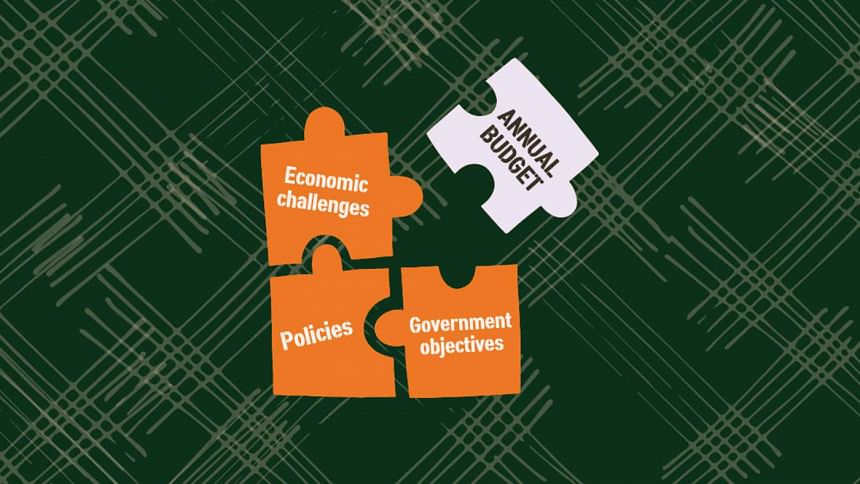Economic challenges that budget 2022-23 must address

The current global political, economic and trade situations are not favourable for a developing country like Bangladesh. Covid fallout and the domino effects of the ongoing Russia-Ukraine war have had profound impacts on the global economy. Such global crises have already exerted unwanted pressure on Bangladesh's domestic economy. The immediate effects are price hikes of food and other essential items. The disruption of supply chains, induced by Covid, is worsened by the Russia-Ukraine war. The International Monetary Fund (IMF) and the World Bank are discussing the possibility of a global recession. Bangladesh, like many other developing countries, is vulnerable to the effects of any global recessionary situation.
Bangladesh's macroeconomic challenges are manifested by high inflationary pressure, escalated current account deficit, negative growth in remittances, stress on the US dollar exchange rate, and strain on the foreign exchange reserves to support a sufficient and comfortable number of months of imports. In addition, long-standing challenges—such as job creation—remain.
The inflationary pressure, triggered by the supply chain disruption and soaring prices of food and essential items in the international market, has led to a situation where marginalised people have been suffering the most. A recent study by Sanem has shown that low income groups in Bangladesh face almost double the inflationary pressure than what the government data suggests. Hoarding and market manipulation by unscrupulous businesspeople taking advantage of the crisis aggravate the situation.
The pressure on forex reserves is high. The surge in imports, alongside a sizeable negative growth in remittances, resulted in a large current account deficit despite a strong export growth. There are concerns about the surge in imports as well—particularly whether illicit money transfer through over-invoicing is causing this import growth. The government's recent decision to raise certain restrictions to slow down the import of luxury goods is timely. However, allegations of over-invoicing are there even in cases of imports of capital machinery and raw materials. The regulatory authorities need to take necessary measures in this regard.
A key area of intervention to check on imports and to provide the right kind of incentives for remittance inflow and export is to contain the misalignment of the USD exchange rate against the taka. The taka's exchange rate against the USD was an area of relief over the last decade with an ample supply of dollars in the market. However, that comfort also diminished with the recent shortage of dollar inflow. Taka's depreciation against the USD cannot be withheld forcefully, and it needs a gradual adjustment. The higher the difference between official and unofficial exchange rates is, the more the remittances would come in through unofficial channels. During Covid, the surge in remittance flow through official channels can largely be explained by the fact that many unofficial channels of sending remittances were blocked for months, which forced the remitters to send money through the official channels. But with economic activities getting back to normal both at home and abroad, along with the widened black-market premium, the official channels of sending remittances have become unattractive once again.
In terms of debt management, Bangladesh is currently not under pressure like Sri Lanka. However, we must remain alert, since many of the megaprojects in the country are foreign-debt-financed and, in recent years, the amount of foreign debt has been on the rise. There are also concerns related to the lack of proper feasibility studies and the cost and time overruns in many megaprojects. All these may create unwanted pressure on Bangladesh's debt burden in the future. Thus, a proper stocktaking of the current megaprojects in this regard is warranted.
Bangladesh is yet to recover from the Covid pandemic. While economic recovery is visible, social recovery in terms of improvement in poor people's livelihood and jobs is slow and not visible enough. Several surveys by Sanem have shown that, while micro- and small enterprises were the primary victims of the Covid fallout, they received the lowest support from the government, and their recovery remained much slower than that of larger-sized firms. Also, in the absence of sufficient support from the government through social protection, affected households resorted to various crisis-coping strategies, risking some long-term negative implications for these households and the economy. Therefore, while the government has a priority to focus more on economic recovery and macroeconomic stability right now, the need to address the concerns of poverty, vulnerability and rising inequality is equally crucial.
Over the last two decades, while Bangladesh has been doing well in macroeconomic stability, such stability came at the cost of lost opportunities for social development as successive governments continued spending very little on education, healthcare, and social protection. Such low social spending can primarily be explained by successive failed attempts to raise the miserably low tax-GDP ratio. However, there are also concerns that policymakers are yet to get their priorities right in the case of investing highly in education, health, and social protection.
There is a need to resolve the high mismatch between the government's stated objectives, plans, and programmes mentioned in critical policy documents (like the Sixth, Seventh and Eighth Five-Year Plans, and the Perspective Plan) and the approaches taken in the annual budgets. All the critical policy documents focused heavily on the significant departure from poor public spending on social sectors, substantially enhancing the tax-GDP ratio, and reforms in some vital economic domains like taxation, banking, capital markets, and export diversification. However, the approaches taken in the annual budgets remained primarily incremental in nature, with no clear links with the critical policy documents and no clear direction of the changes.
Bangladesh is facing its biggest macroeconomic challenge in a decade. The country will also be confronting a new set of challenges after its graduation from the LDC status by 2026. At the same time, Bangladesh aims to achieve large development goals by 2030. Therefore, incremental approaches taken in the national budgets will not be helpful at all. The issue of resolving policy paralysis in undertaking and effectively implementing important policies, strategies, plans, and programmes will remain critical in the coming days.
Dr Selim Raihan is a professor at the Department of Economics of the University of Dhaka, and executive director at the South Asian Network on Economic Modeling (Sanem).

 For all latest news, follow The Daily Star's Google News channel.
For all latest news, follow The Daily Star's Google News channel. 










Comments